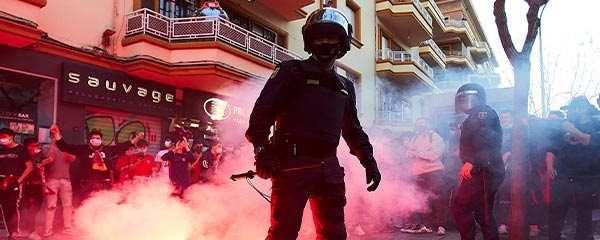Story Highlights
- 40% are afraid to walk alone at night near home, highest in three decades
- Worry about being victimized by specific crimes remains near record highs
- Fear of crime deters most Americans from doing some routine activities
WASHINGTON, D.C. -- Forty percent of Americans, the most in three decades, say they would be afraid to walk alone at night within a mile of their home. This indicator of crime fears last reached this level in 1993, when, during one of the worst crime waves in U.S. history, 43% said they would be afraid. Between that year and 2021, an average of 35% of adults have feared for their safety within a mile of home, with the annual results ranging between 29% and 39%.
���۴�ýhas measured Americans’ sense of personal safety from crime using this question since 1965, finding a record 48% worried in January 1982. That was toward the end of another high-crime period and as an alarmingly high murder rate in New York City was garnering widespread attention.
The 29% low was recorded in October 2020, during the first year of the COVID-19 pandemic, when much of the country was still social distancing. However, by the following year it had bounced back to the pre-pandemic level of 37% before edging higher to 40% today.
The latest results are from Gallup’s annual Crime poll, conducted Oct. 2-23, which also finds relatively high proportions of Americans rating the crime problem as serious and believing it has worsened over the past year.
As is typical, fear of walking alone at night is much higher among women (53%) than men (26%). Reflecting differences in the crime rates of the areas where people live, fear of crime is also higher among adults living in households earning less than $40,000 per year (49%) than among those earning $40,000 to $99,999 (39%) or $100,000 or more (31%). And it is higher among residents of cities (50%) than those living in suburbs (39%) or town/rural areas (30%).
Fear of Specific Crimes Remains at or Near Record-High Levels
The new poll also asks Americans how often they worry about experiencing various specific crimes. Consistent with prior years, the most common crime concern is being the victim of identity theft. Seventy-two percent of U.S. adults say they frequently or occasionally worry about this happening to them.
Additionally, half of U.S. adults worry about having their car stolen or broken into, while 44% worry about their home being burglarized when they aren’t there. More than three in 10 worry about getting mugged (37%) or being attacked while driving (32%).
Slightly lower levels of concern are seen for being the victim of a hate crime (30%), getting murdered (28%) or being sexually assaulted (27%).
The high points of public concern for nearly all of these crimes have been recorded in the years since 2020. The only exception is Americans’ fear of having their home burglarized when they are not there, which reached its high point of 50% in 2006 and is currently 44%. ���۴�ýhas tracked public concern about these crimes almost every year since 2001.
Compared with before the pandemic, concern is up particularly sharply on four crimes. After peaking in 2022, Americans’ fears of being mugged, murdered, or attacked while driving have dipped slightly this year but remain higher than at all earlier points in the trend. Meanwhile, with car thefts up sharply in the U.S. this year, fear of having one’s car stolen or broken into is at a record-high 50%, edging up from 47% a year ago.
Fear of Crime Limits Visiting Cities, Exercising Outdoors
Some insights into how fear of crime affects individuals -- and, by extension, society -- come from a question included in an Oct. 4-16 ���۴�ýPanel survey that asks Americans whether fear of crime or violence against them ever prevents them from doing various activities.
Fear of crime most commonly constrains people's mobility and possibly consumerism by preventing them from driving into certain areas of the town or city where they live -- 34% say they have ever avoided doing this. Relatedly, 31% say they avoid visiting central areas of nearby cities. Only compounding the potential damper crime puts on economic activity, 17% avoid going to shopping malls.
Some Americans’ physical wellbeing is also jeopardized, as 31% say fear of crime has ever prevented them from taking walks, jogging or running alone in their area, and 17% say it keeps them from going to local parks.
Americans may also be missing out on entertainment or social interactions, as fear of crime prevents large segments from attending concerts and other crowded events (28%) and talking to strangers (28%).
Respondents were shown a list containing these precautionary behaviors and asked to select all that apply to them. Overall, 66% of adults have avoided at least one of the activities due to fear of crime, while 34% say they have avoided none of them.
Crime Fears Are a Greater Deterrent to Women Than Men
Similar to the gender gap seen in fear of walking alone at night in one’s local area, women are more likely than men to say fear of crime has ever prevented them from taking walks, jogging or running alone in their area. They are also significantly less likely to talk to strangers, go to shopping malls or parks, and to attend crowded events.
There are minimal to no differences by gender in reluctance to drive to certain areas of one’s town or to visit central areas of nearby cities. Nevertheless, the net result is that men (43%) are far more likely than women (26%) to disregard the risk of crime when going about their lives.
Separately, the poll finds far more Americans saying they feel safer going to places like stores and parks during the daylight hours (80%) than feel just as safe after dark (19%). Women (87%) are a bit more likely than men (73%) to prefer venturing out during daylight, but large majorities of both groups feel this way.
Bottom Line
Whether because of sharp increases in violent crime during the pandemic or media coverage of other crimes, Americans’ sense of security from crime has been rattled in recent years. That carries over into their attitudes today, reflected in a rise in Americans’ fear of walking alone at night in their own area to a three-decade high, and their fear of being the victim of several violent crimes being the highest in trends since 2000.
Heightened fear of crime may be causing Americans to change their behaviors in ways that have profound effects on the nation’s economy and social fabric. It could also influence their candidate or party preferences in the 2024 elections. Only 3% of Americans in October cited crime as the nation’s “most important problem,” far behind mentions of immigration, inflation and the economy in general. Yet, in March, crime ranked third among 15 issues in the amount Americans say they worry about each. It was also the third-highest-scoring issue in importance to registered voters in the 2022 elections. As such, crime seems to be a sleeper issue, but one that Americans care about when it’s raised.
To stay up to date with the latest ���۴�ýNews insights and updates, .
Learn more about how the works.
View complete question responses and trends (PDF download).




